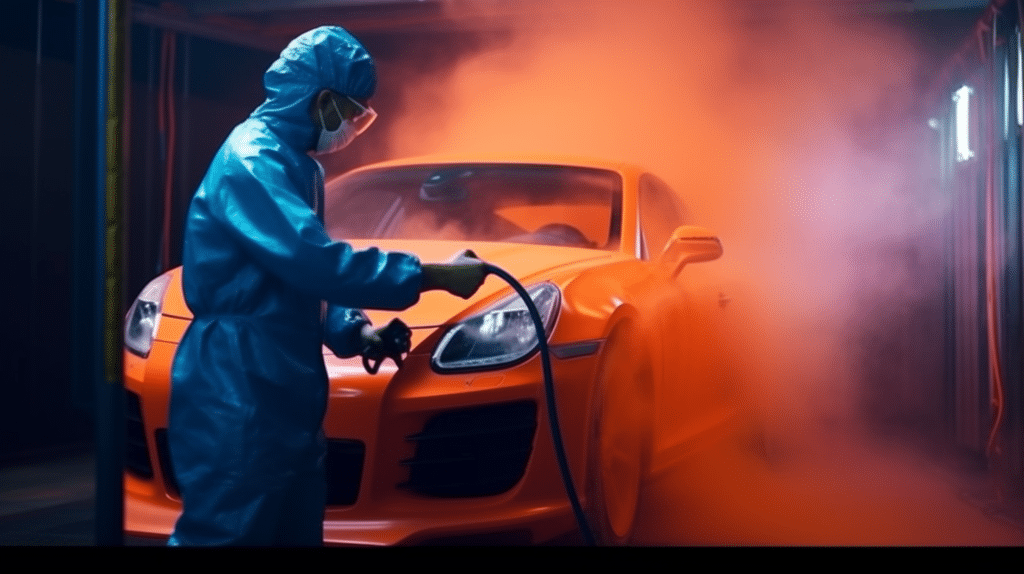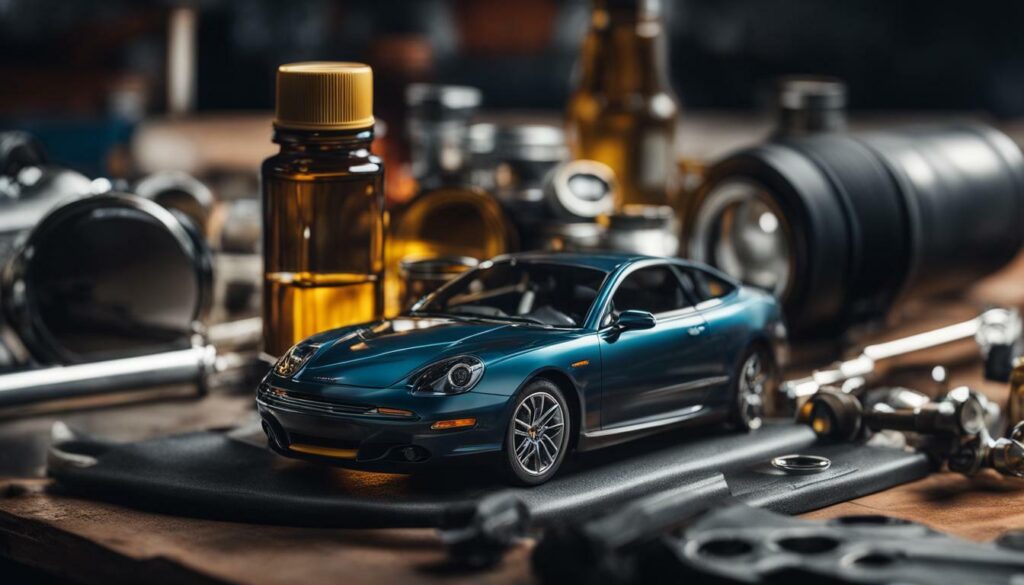Car overheating can be a concerning issue that requires immediate attention. Understanding the causes and symptoms of an overheating engine can help you take appropriate action and prevent further damage to your vehicle. In this article, I will discuss the common causes of car overheating, signs to look out for, and steps you can take to resolve the issue.
Key Takeaways:
- Car engines can overheat due to various reasons, including a cooling system leak, faulty water pump, bad radiator, low engine oil level, or thermostat failure.
- Signs of an overheating engine include steam or smoke coming from under the hood, an engine temperature gauge spiking to “H,” or strange smells from the engine area.
- If your engine overheats, turn off the A/C and crank the heat, find a safe place to pull over, and allow the engine to cool down before restarting it.
- Avoid panic and refrain from driving while your car is overheating. Opening the hood immediately can be dangerous due to the risk of burns from steam or smoke.
- Regular maintenance, inspections, and following manufacturer recommendations can help prevent car overheating and ensure the proper functioning of the cooling system.
Common Causes of Car Overheating
Car engine overheating can occur due to various reasons. Understanding the common causes can help you identify and address the issue promptly, preventing further damage to your vehicle. The following are some of the main culprits behind car engine overheating:
Cooling System Leak
A cooling system leak can lead to car engine overheating. This issue can arise from a faulty hose, worn-out gasket, cracked engine block, or radiator damage. A leak in the cooling system compromises the proper circulation of coolant, resulting in inadequate heat dissipation and increased engine temperature.
Faulty Water Pump
The water pump plays a crucial role in maintaining coolant flow within the engine. If the water pump fails or becomes faulty, it disrupts the circulation of coolant, causing heat to build up and leading to car engine overheating. Common causes of water pump failure include bearing wear, impeller damage, or seal leaks.
Bad Radiator
The radiator is responsible for transferring heat away from the engine. If the radiator has blocked passages, damaged fins, or a leak, it can impact its cooling efficiency. A compromised radiator fails to dissipate heat effectively, resulting in car engine overheating. Regular inspection and maintenance of the radiator can help prevent such issues.
Low Engine Oil Level
Proper lubrication is essential for the smooth functioning of the engine. When the engine oil level is low, the moving parts experience increased friction, leading to heat buildup. Over time, elevated temperatures can contribute to car engine overheating. Regularly checking and maintaining the engine oil level is crucial for preventing this issue.
Regular maintenance and inspections play a vital role in preventing car engine overheating. By addressing cooling system leaks, maintaining the water pump and radiator, and ensuring adequate engine oil levels, you can avoid the inconvenience and potential damage caused by an overheating engine.
| Common Causes of Car Overheating | Preventive Measures |
|---|---|
| Cooling System Leak | Regular inspection and maintenance to identify and fix leaks in hoses, gaskets, and other components. |
| Faulty Water Pump | Regularly check the water pump for signs of wear or leaks and replace it when necessary. |
| Bad Radiator | Inspect the radiator for blockages, fin damage, or leaks and perform necessary repairs or replacement. |
| Low Engine Oil Level | Regularly check engine oil levels and top up as necessary to maintain proper lubrication. |
Signs of an Overheating Engine
Recognizing the signs of an overheating engine is crucial for taking immediate action and preventing further damage. Here are the common symptoms to watch out for:
- Steam or Smoke: If you see steam or smoke coming from under the car hood, it’s a clear indication of an overheating engine. Steam may be mistaken for smoke, but both point to the same problem.
- Engine Temperature Gauge: Keep an eye on your car’s temperature gauge. If it spikes to “H” or enters the red zone, it’s a definite sign of engine overheating. This gauge measures the temperature of the engine coolant and can help you identify a potential issue.
- Strange Smells: Unusual smells, such as a sweet or burning odor, coming from the engine area can be a symptom of an overheating engine. These smells are often caused by coolant leakage or engine fluids reaching high temperatures.
Being vigilant and aware of these signs allows you to take appropriate action promptly, preventing further damage to your engine. If you notice any of these symptoms, it’s important to address the issue as soon as possible.
What to do When Your Engine Overheats
When your engine overheats, it is crucial to take immediate action. Follow these steps to prevent further damage and ensure your safety:
- Turn off the air conditioner and crank the heat to reduce stress on the engine.
- Find a safe place to pull over and shut off the car.
- Allow the engine to cool for at least 15 minutes while keeping an eye on the temperature gauge.
- Carefully restart the engine and drive to the nearest auto repair shop.
It’s important to avoid panic and refrain from driving with an overheating engine. Opening the hood immediately can also be dangerous as it can cause burns from steam or smoke. By following these steps, you can ensure the proper car overheating repair and troubleshooting.

If the water/antifreeze mixture in the cooling system is not circulating correctly, the engine can start to overheat. This can be caused by various issues, such as a leak in the cooling system or a blocked or detached coolant hose. When the coolant fails to flow properly, heat builds up within the engine, leading to a rise in temperature.
Regular maintenance and inspections of the engine cooling system are crucial in preventing overheating issues. It is recommended to periodically check the coolant levels and address any leaks or blockages promptly. Consulting a certified mechanic can help identify and resolve these issues before they escalate into more extensive and expensive repairs.
Components of the Engine Cooling System
The engine cooling system consists of several components, each playing a specific role in maintaining the optimal temperature. Here is a breakdown of the key components:
| Component | Function |
|---|---|
| Radiator | Allows the coolant to transfer heat to the surrounding air through its cooling fins. |
| Water Pump | Circulates the coolant throughout the engine and radiator, ensuring proper heat transfer. |
| Thermostat | Regulates the flow of coolant based on the engine’s temperature to maintain optimal operating conditions. |
| Coolant | Mix of water and antifreeze that absorbs heat from the engine and prevents it from freezing or boiling. |
| Coolant Hoses | Transport the coolant between the engine, radiator, and other cooling system components. |
| Expansion Tank | Stores excess coolant and allows for expansion and contraction due to temperature changes. |
Each component of the engine cooling system must be in proper working condition to ensure effective heat dissipation and prevent car engine overheating. Regular inspections and maintenance can help identify any issues and address them before they lead to more significant problems.
Why Do Engines Overheat and How to Avoid It?
Engines can overheat for various reasons, and it’s crucial to understand these causes in order to prevent this problem from occurring. Let’s explore the common culprits behind engine overheating and some preventive measures you can take.
Common Causes of Engine Overheating
There are several factors that can lead to engine overheating:
- Cooling system problems: Issues like leaks, blockages, or malfunctions in components such as the water pump or radiator fan can disrupt the proper cooling of the engine.
- Low coolant level: Insufficient coolant can hinder the engine’s ability to dissipate heat, causing it to overheat.
- Malfunctioning thermostat: A faulty thermostat may not regulate the flow of coolant properly, leading to overheating.
- Failing water pump: The water pump is responsible for circulating coolant throughout the engine. If it fails, the coolant won’t be able to cool the engine effectively.
- Blocked radiator: A radiator with blocked passages or damaged fins cannot efficiently dissipate heat, resulting in engine overheating.
Preventing Engine Overheating
Regular maintenance and proactive measures can help you avoid engine overheating. Here are some preventive steps to follow:
- Inspect the cooling system: Regularly check the coolant levels and look for any signs of leaks or damage. Address any issues promptly.
- Maintain proper coolant mixture: Follow the manufacturer’s recommendations for the correct coolant-to-water ratio to ensure optimal cooling performance.
- Monitor the temperature gauge: Keep an eye on the engine’s temperature gauge while driving. If you notice it climbing towards the red zone, take immediate action.
- Check the thermostat: Have the thermostat inspected by a certified mechanic to ensure it is functioning correctly and regulating coolant flow appropriately.
- Keep the radiator clean: Regularly clean the radiator’s exterior to remove debris and dirt that could obstruct airflow.
- Inspect hoses and belts: Check for any signs of wear or damage in the cooling system hoses and belts. Replace them if necessary.
- Drive responsibly: Avoid pushing your engine too hard, especially in extreme weather conditions or when towing heavy loads. Overexertion can increase the risk of overheating.
To summarize, understanding the causes of engine overheating and implementing preventive measures can help you avoid this frustrating and potentially damaging issue.
Visually Engaging Table: Common Causes of Engine Overheating
| Cause | Description |
|---|---|
| Cooling system problems | Leaks, blockages, or malfunctions in components like the water pump or radiator fan. |
| Low coolant level | Insufficient coolant to properly dissipate heat. |
| Malfunctioning thermostat | Failure to regulate coolant flow effectively. |
| Failing water pump | Inability to circulate coolant adequately. |
| Blocked radiator | Passages obstructed or fins damaged, hindering heat dissipation. |
Conclusion
Car overheating is a serious issue that requires immediate attention to prevent further damage to the engine. By staying vigilant and recognizing the signs of an overheating engine, such as steam or smoke, high engine temperature, and strange smells, you can take the necessary steps to cool down the engine and avoid costly repairs.
To prevent car overheating, regular maintenance and inspections are essential. Be sure to check coolant levels, address any leaks promptly, and follow the manufacturer’s recommendations for maintaining the cooling system. By being proactive and taking care of your car’s cooling system, you can greatly reduce the risk of overheating.
If you experience repeated instances of engine overheating, it is crucial to consult a professional mechanic. They can help identify and resolve any underlying issues that may be causing the overheating problem. Remember, taking care of your car’s cooling system is a proactive approach to ensure worry-free driving and extend the lifespan of your vehicle.
FAQ
What are the common causes of car overheating?
Car engines can overheat due to various reasons, including a cooling system leak, faulty water pump, bad radiator, low engine oil level, or thermostat failure. These issues can lead to serious engine damage if not addressed promptly.
What are the signs of an overheating engine?
Signs of an overheating engine include steam or smoke coming from under the hood, the engine temperature gauge spiking to “H” or into the red, and strange smells coming from the engine area.
What should I do when my engine overheats?
When your engine overheats, it is crucial to take immediate action. Turn off the air conditioner, crank the heat, find a safe place to pull over, and allow the engine to cool for at least 15 minutes. Restart the engine and drive to the nearest auto repair shop.
What should I not do when my engine overheats?
Do not panic or engage in erratic driving behavior. Avoid opening the hood immediately as it can expose you to the risk of burns from steam or smoke. Refrain from continuously driving with an overheating engine as it can lead to further damage.
How can I prevent an overheated car engine?
Regular maintenance and inspections are key to preventing an overheated car engine. Maintain proper coolant levels, check for leaks, inspect hoses, fans, and the thermostat, and follow manufacturer recommendations for radiator maintenance.
What should I know about the engine cooling system?
The engine cooling system plays a vital role in regulating heat within the engine compartment. Issues such as leaks in the cooling system or blocked coolant hoses can lead to engine overheating. Regularly check coolant levels and address any leaks or blockages.
Why do engines overheat and how can I avoid it?
Engines can overheat due to problems in the cooling system, leaks, blockages, or malfunctions in components like the water pump or radiator fan. Regular maintenance and inspections can help prevent engine overheating. Take prompt action if you notice any signs of overheating.
How can I prevent car overheating?
Preventive measures for car overheating include regular inspections, coolant exchanges, checking coolant levels, addressing leaks, and following manufacturer recommendations for maintenance. Being proactive with maintenance can greatly reduce the risk of an overheated car engine.
Why is it important to address car overheating promptly?
Car overheating can lead to serious engine damage if not addressed promptly. By taking immediate action and seeking professional help, you can prevent further damage and costly repairs.




